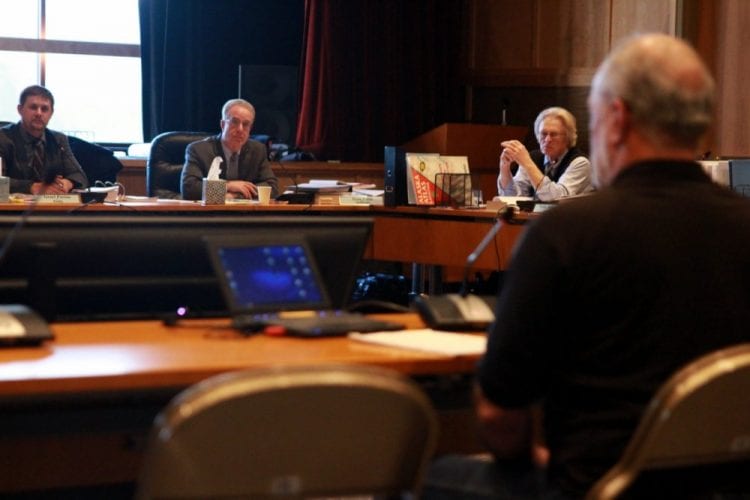
Board of Fisheries members Israel Payton (Wasilla), Alan Cain (Anchorage), and Fritz Johnson (Dillingham) hear testimony on shellfish proposals on the first day of the Southeast Shellfish/Finfish meeting in Sitka. (Robert Woolsey/KCAW)
Alaska’s Board of Fisheries Saturday voted down a proposal to change commercial Dungeness crab seasons in Southeast Alaska. Crabbers were seeking set season lengths and no option for shortened fishing time like they experienced in 2017.
Crabber Max Worhatch proposed the change and successfully got the board to add the proposal to the meeting after missing the deadline for regulation changes.
“I would like to seriously consider this,” Worhatch told the board. “I put a proposal in, just like this three years ago, didn’t get anywhere. The department felt like they had to have something to manage the fishery when it got to the low end. But in my experience and just from what I’ve seen in Oregon, California and Washington, size sex and season for Dungeness crab works and it works extremely well. It’s kindof an autopilot thing, doesn’t take a lot of work.”
Size, sex and season, the three Ss, are a management tool for regulating the catch of crab, with a minimum size, allowing crabbers to only keep male crab and only during a set season. While that’s part of the management in Southeast Alaska, since 2000 the Alaska Department of Fish and Game has also set the season length based on the catch from the first week of the season. In 2017, a low commercial catch in that first week led to shortened summer and fall seasons in most of the region.
The board considered an amended proposal for set seasons, with the same starting and ending dates already used around region but deleting the language in the management plan that allows for early closure with low catches. Crabbers said they needed the assurance of scheduled fishing time, especially with the fleet fishing in smaller areas with competition from sea otters.
Part of the Southeast Alaska summer commercial crab fishing season overlaps with the time when male Dungeness molt, or shed their shell and grow a new one. Fish and Game’s director of the commercial fisheries division Scott Kelley said other seasons in Oregon and Washington are in the winter, timed to avoid soft crab from shell molting. “So they’re fishing at a time, deliberately fishing on a time when crab are hard and not as susceptible to handling mortality,” Kelley said. “We’re not doing that. That’s where the department’s concern comes through. We want to provide a little bit of additional opportunity at times of low abundance to leave some more breeding males on the grounds to mate and preserve the population.” The department opposed the proposal and has even sought a fall winter season only like other states.
Board chair John Jensen of Petersburg explained the shortened season is difficult for crabbers who are also in other fisheries in the summer. “This plan last year the way it happened these folks that were up harvesting hatchery fish up in the Lynn Canal area had to make a decision whether to just take their (crab) gear out of the water or take a chance of having their gear in the water when they closed it so,” Jensen said. “It’s kindof a business plan also for these guys that fish multiple permits and try to make a living at it.”
But other board members were not supportive.
Reed Morisky of Fairbanks noted objection to the change because it was a board generated proposal and added to the meeting agenda in October. “I believe we’ll be hearing more concern about board generated proposals at a potential joint board meeting,” Morisky said. “That’s come up in the past. There’s been other entities that have been involved in the discussion of board generated proposals so, for this one I do have concerns because of that.”
And Robert Ruffner of Soldotna thought opposition to the change was pretty strong from Fish and Game. “With the department’s opposition and the statements that they made here on the record I’m probably not going to be in support of this at this time. But I do appreciate all the effort and desire that people had to come forward and propose this change but I’m just not comfortable with it right now.”
The vote was 6-1 against the change with only chair Jensen in support. Board members also voted down a proposed increase in the maximum number of Dungy crab pots that could be fished from one commercial boat. They did approve an expanded commercial closed area around the community of Hollis and voted down a Dungy crab sport fishing closure around Craig and Klawock.











